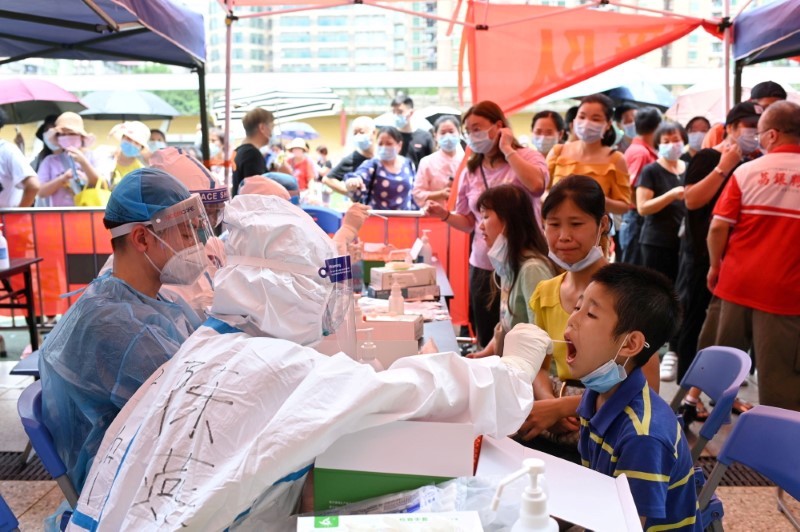Millions of residents in Guangzhou were told on Wednesday to undergo mass testing for Covid, after infections topped 2,000 for the second day running.
Local cases in China have reached their highest level since April 30 and about a third were in the southern manufacturing hub, which has a population of nearly 19 million.
This is the city’s worst outbreak, with five of Guangzhou’s 11 districts – and more than half of the population – affected.
The news on mass testing was announced on social media. It comes as China battles a rebound in infections in several economically vital cities, including the capital Beijing, as well as Zhengzhou and Chongqing.
This, of course, has dampened hopes that the world’s second-largest economy might ease curbs and restrictions soon.
Authorities are determined to get on top of the outbreaks and make good on President Xi Jinping’s zero-Covid policy, without having to impose mass lockdowns of the sort that shut Shanghai earlier this year.
The districts in Guangzhou subject to mass testing this week include Haizhu, which has seen the bulk of the city’s cases. A district-wide lockdown from Saturday to Monday has been extended to Friday as cases rise.
“My residential compound in Tianhe (district) has been locked up since yesterday,” Guangzhou resident Jason Li said. “I was suddenly notified by my compound. Residents were instructed not to leave our building.”
Li said he hadn’t been told for how long his compound would be locked up.
“Thank god I’ve stocked up on groceries recently,” he said.
Lily Li, another Guangzhou resident, said the outbreak in the city had worsened in the past two days, having spread to Tianhe, just north of Haizhu.
“Honestly, it’s already a huge surprise that Tianhe hadn’t been affected sooner,” she said.
Guangzhou reported 2,637 new locally transmitted Covid cases for Tuesday November 8, up from 2,377 a day earlier. This was nearly a third of the 8,176 new local infections reported in China today.
ALSO SEE:
China’s Factory Gate Prices Fall for First Time in Nearly 2 Years
Economic Toll
In the latest sign of how anti-virus measures are crushing consumer demand, China’s factory gate prices for October dropped for the first time since December 2020 and consumer inflation moderated, in part due to strict Covid curbs.
While Covid cases in China are small by global standards, the policy response has been relentless and mass testing for large populations has been the norm since 2020.
Mass testing is generally free, but some local governments are resuming charges for tests as their finances come under strain amid a slowing economy.
Even Chengdu, the sprawling capital of southwestern Sichuan province, will end free Covid tests at the end of the month.
Reflecting the financial stress that Covid testing has inflicted on smaller cities, a testing company in Xuchang, a city in Henan province, threatened on Tuesday to stop all testing-related work from Friday due to late payments from authorities. But on Wednesday, the firm said the payment issue had been resolved and testing would go ahead.
Zhengzhou iPhone Factory
Meanwhile, in central China, Apple supplier Foxconn said it would continue to maintain closed-loop operations – a system where staff live on-site isolated from the wider world – at its iPhone plant even as the economic zone that housed the factory lifted a seven-day lockdown.
Taiwanese contract manufacturer Foxconn has declined to disclose the number of infections or comment on the conditions of those infected.
Issues at the plant have significantly reduced production of Apple’s new iPhone 14 models, prompting the tech giant to say on Monday it expects lower shipments of latest premium models.
The world’s biggest iPhone factory, which usually has about 200,000 workers, has become to a symbol of worker discontent over its harsh Covid curbs.
The company did not say how long it expects the closed-loop system – imposed at the plant in mid-October – would remain in place.
In recent weeks, many fled – with their escapes were captured on social media – because of frustration over how Covid cases were handled.
They were also unhappy about the treatment of employees, including what they said was insufficient provision of food.
- Reuters with additional editing by Jim Pollard
Note: This report was updated with details about the mass testing in Guangzhou and its headline and photo changed on November 9, 2022
ALSO SEE:
Apple Warns Covid Curbs in China Have Hit iPhone Output
Companies Battle on as Covid Cases Climb in China
Shanghai Disneyland Hit by Covid, Foxconn Quadruples Pay
China Braces For Covid Wave As Foxconn Staff Flee Zhengzhou
























